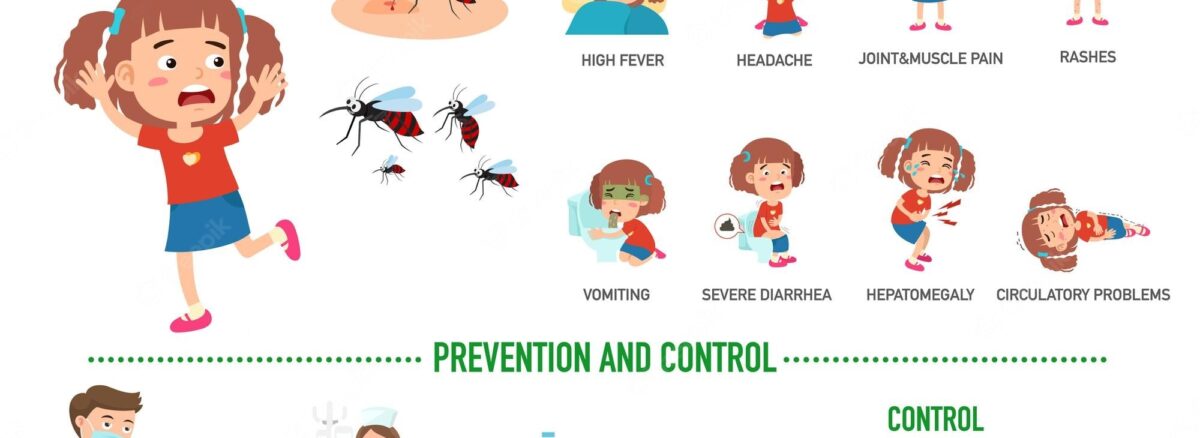- December 6, 2022
- GBH Staff Members
- Comment: 0
- Health Tips
Dengue fever is a frequent viral disease produced by the bite of an Aedes Aegypti mosquito. Dengue fever can be caused by any of the four viruses carried by the mosquito. Dengue fever is said to be at its peak between the monsoon months of July and October.
When an Aedes aegypti mosquito bites a person infected with the dengue virus, the person’s blood is transmitted to the mosquito. Similarly, when a mosquito bites another person, the virus leaves its body and enters the other person’s body. This cycle continues, affecting many people.
The symptoms of the fever can be apparent after 4 to 5 days. Most cases of this fever are observed around hotspots, such as standing water. These mosquitoes prefer to deposit eggs near stagnant water sources that have not moved in a long time. Dengue fever is also known as break-bone fever. Now that we have clarified what dengue is, let us move on to the following areas.
Symptoms
Many people have no signs or symptoms of dengue fever.
When symptoms do appear, they can be confused with some other illnesses, such as the flu, and normally appear four to ten days after being bitten by an infected mosquito.
Dengue fever causes a high fever of 104 degrees Fahrenheit (40 degrees Celsius) as well as any of the following signs and symptoms:
- Rash.
- Nausea.
- Vomiting.
- Headache.
- Glandular swelling.
- Back of the eye pain.
- Pain in the muscles, bones, or joints.
Most people recover in about a week. Symptoms might intensify and become life-threatening in some circumstances. This condition is known as severe dengue, dengue haemorrhagic fever, or dengue shock syndrome.
When your blood vessels become broken and leaky, you develop severe dengue. In addition, the number of clot-forming cells (platelets) in your blood decreases. Shock, internal bleeding, organ failure, and even death can result from this.
Severe dengue fever, which is a life-threatening emergency, can manifest swiftly. The following symptoms may appear within the first day or two after your fever has subsided:
Severe dengue fever Symptoms
- Fatigue.
- Constant vomiting.
- Severe stomach ache.
- Irritability or agitation.
- Bleeding from the nose or gums.
- Breathing that is difficult or quick.
- You have blood in your pee, faeces, or vomit.
- Bleeding beneath the skin, which may seem like bruises.
Precautions
Dengue is a serious disease, but it can be avoided, if necessary, and precautions are followed beforehand.
- The first and most important step in preventing Aedes mosquitos is to seal the entrance gate. This can be accomplished by taking basic efforts such as not allowing any water to stand still at any moment. Any areas that could create a breeding ground for Aedes mosquitoes should be cleaned regularly. You should keep an eye on the cooler, tiny containers, pots, and even buckets.
- Another thing to remember is to protect yourself by following safety precautions. During the day, aerosol can be used to repel mosquito bites. At night, you can also use mosquito netting or other sorts of equipment to keep the hazardous mosquitos at bay. Aside from these dengue prevention measures, one should also wear clothing that covers all body parts, especially the hands and legs, which are the most vulnerable to mosquito bites.
Remedies
- Another thing to consider is the fluid content of the body. Try to incorporate a variety of fluids such as juices, soups, and water. Fruits also play a vital function in restoring the body’s power during the healing process. Because no medicine can stop or treat a fever, painkillers can be utilised.
- The patient’s platelets should be closely examined at regular intervals, and if the treatments are not functioning, the patient should be admitted to the hospital. Remember that dengue haemorrhage is a dangerous and fatal stage, so seek emergency medical assistance. Dengue fever mercilessly damages the bone marrow and white blood cells of the susceptible, making recovery time-consuming.
Conclusion
Dengue fever is a widespread illness that often improves in a few days with adequate dengue medication. Follow all preventive actions to avoid becoming ill and prevent your region from becoming a dengue hotspot. If contracted, one should take appropriate medicine and seek medical assistance.


